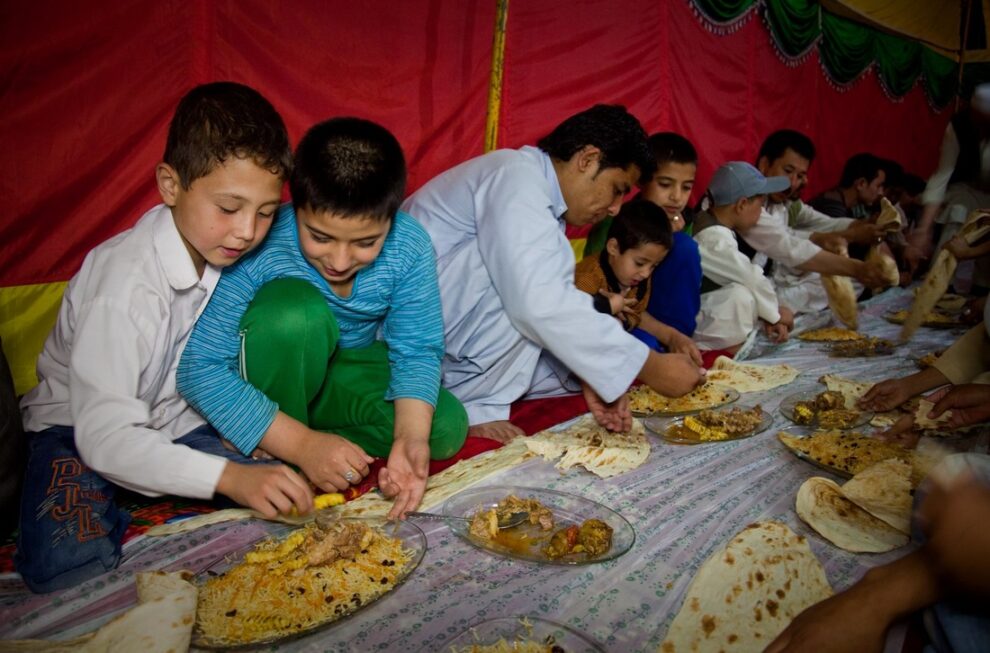Etiquette
Primary AuthorNina Evason, 2019
Basic Etiquette
- Use your right hand or both hands together to gesture or offer anything. The left hand is used for cleaning and hygiene purposes and should not be used to gesture or touch things (e.g. food/people). See more under Communication.
- In Afghanistan, one should not touch people of the opposite gender unless they are very close family or friends.
- Leave the door open if talking one on one with an Afghan of the opposite gender.
- It is extremely inappropriate and disrespectful for men to enquire about an Afghan man’s female family members, unless you know the family or person well.
- If you wish to smoke, it is polite to offer a cigarette to everyone in your company.
- Ask an Afghan’s permission before taking their photograph – especially if they are a woman.
- It is rude to walk away from someone while they are still talking to you.
- Both men and women should dress modestly when meeting an Afghan. In Afghanistan, women should only let their face, hands and feet show, and the definition of the legs should not be distinguishable.
- It is very difficult to be punctual during one’s daily activities in Afghanistan as various incidents often occur (whether it be a pressing family matter, terrible traffic in cities, roadblocks, a power outage or an insurgent-related threat). There is also a widely held belief that one will arrive if and when God deems it – “Inshallah” (“If God wills it”). In conjunction with this fatalistic approach, people’s views of time are often a lot more flexible than Western notions of punctuality. They tend to be more understanding of lateness and generous with their time.
Offering and Complimenting Items
- In Afghanistan, people generally extend an offer multiple times. It is expected that you politely decline the gesture initially before accepting on the third offer. This exchange is polite as the insistence to extend the invitation shows hospitality and the initial refusal to accept shows humbleness and that one is not greedy.
- Be sure to offer everything multiple times in return. If you only offer something once, an Afghan person may respond, “No, it’s okay”, out of modesty and politeness even though they meant to accept on the second offer.
- Be careful when you compliment an item in an Afghan’s house, as they may feel compelled to offer it to you as a gift. If they try to give it to you, insist that you appreciate their gesture but do not want to take it. An Afghan is likely to offer the object out of politeness, and if you accept, they may end up giving you something they wished to keep.
- There is a strong belief in the evil eye in Afghanistan whereby one’s misfortune is caused by another’s envy, sometimes taking the form of a curse. Do not compliment something more than once or continue to praise it once you have acknowledged it. This may cause an Afghan to be wary that the evil eye will be jealous of it.
- People say “Mashallah” (May God bless) to ward off the evil eye after a compliment to show you don’t have bad intentions.
- Show gratitude and humility when offered a compliment. This is done by responding with an equally respectful compliment on the same subject. If they are Muslim, you may wish them Allah’s (God’s) blessings.
Visiting
- Afghans take great pride in their hospitality. It is considered an honour to host guests. Therefore, one may find that an Afghan seeks to host you quite early on in your friendship.
- An invitation is not always needed in order to visit one’s house in Afghanistan. Neighbours and friends may pay each other visits without planning them first.
- Verbal invitations to visit someone’s home may be open-ended. For instance, an Afghan may say that the person is welcome to visit without giving specifics on when that time should be. The guest is then expected to be opportunistic and visit soon. It is advisable to make it your responsibility to organise the place and time of a visit after an Afghan has expressed interest in a friendship to avoid cross-cultural miscommunications.
- Remove your shoes at the door when visiting a home.
- Wait to be led through the house and shown where to sit.
- Men and women are separated in most social visits. Men socialise in one room, and women in another. The female hosts generally bring food and refreshments to the men before leaving and joining the women again.
- You may be seated on the floor with rugs and cushions. Sit crossed-legged if you can or otherwise in a position that is comfortable for you. Avoid sitting with your legs outstretched or with the soles of your feet facing another person.
- It is customary to be offered tea and sweets as refreshment. It is very important to accept any refreshment (typically coffee/tea) as a mark of friendship. Non-acceptance would be perceived as highly offensive and could create misunderstanding even if you are simply not thirsty. Your cup of tea will be constantly filled until you indicate you’ve had enough by covering it with your hand and thanking them.
- As a guest, expect to be offered the best of everything (the best cut of meat, best silverware, etc.). Even the poorest family will go to great lengths to make sure a guest feels welcomed and has the best treatment able to be given. Try to graciously accept everything offered. Refusing an Afghan’s generosity can be awkward.
- Dogs are considered unclean in Afghanistan and are not meant to be let into areas where people pray (i.e. homes). Therefore, people rarely bring them inside their houses and it’s not common to have them as pets. Some Afghans may be uncomfortable around them or afraid of them. Let your Afghan counterpart know in advance if you have a pet dog and keep it in a separate room or outside whilst they are visiting. Do not ask them to sit in a place where your dog has just been resting. For example, it would be seen as rude for you to tell your dog to get off the couch and then offer someone to sit in its place.
Eating
- Dining etiquette differs between Afghan homes, but cooking and food preparation is generally the cultural responsibility of women. Usually the women will prepare the food in the kitchen while men socialise elsewhere. It may be inappropriate for a man to show that he has knowledge about the kitchen or cooking among peers.
- Men and women usually eat separately when dining at home. The female hosts generally bring food and refreshments to the men before leaving and joining the women again.
- People gather around a large common platter that may be placed on a table or the ground and eat from shared dishes
- In some houses, you may be seated on cushions on the floor to eat. Food may be served on a tablecloth that is spread between these cushions.
- It is important to wash your hands before a meal is served.
- Afghan food may not require utensils to eat. Everyone normally uses their right hand to serve themselves from a dish, scooping with the fingers.
- Scoop food into a ball at the tip of your fingers before putting it into your mouth. Naan bread may be provided as a scoop.
- The left hand should not make direct contact with food.
- It is polite to leave some food at the end of the meal to indicate to the host that they have provided adequately. Eating everything on your plate is an indication you are still hungry and want another serving.
- Alcohol and pork are prohibited in Islam and rarely consumed in Afghanistan. Do not offer alcohol or pork by-products (e.g. gelatine) to your Afghan counterpart if you know that they are Muslim.
- Do not offer food to a fasting Afghan before sundown during the month of Ramadan. It is polite to avoid eating or drinking in front of them during fasting hours as well.
Gifts
- Gifts may be given upon visiting someone’s home for the first time.
- If you are invited to lunch or dinner, you may bring a gift that can be eaten for dessert (e.g. fruit, sweets, pastries).
- It is best to be subtle and humble when giving gifts. Walking straight through the door and presenting them with the gift right away would be seen as very forward and puts an Afghan in the awkward position of having to open it in front of you. Instead, try and place it near the door as you enter or on the table as you sit down so that the receiver sees it, but can open it in their own time.
- Do not give alcohol as a gift to a devout Muslim or any Afghan you do not have a close personal relationship with. If you know from first-hand experience that your friend drinks, you may give alcohol, but ensure that it is done covertly so their peers do not know. Revealing to their family or friends the fact that they drink could bring great shame on them.
- It is also inappropriate to give pig/pork-based items, such as leather.
- There are not many special customs concerning gift-wrapping so long as the gift is presented neatly. Green wrapping paper is often used for wedding presents.
Source: Cultural Atlas
















